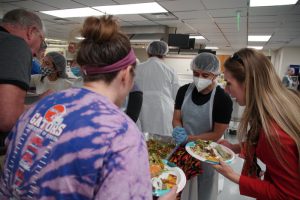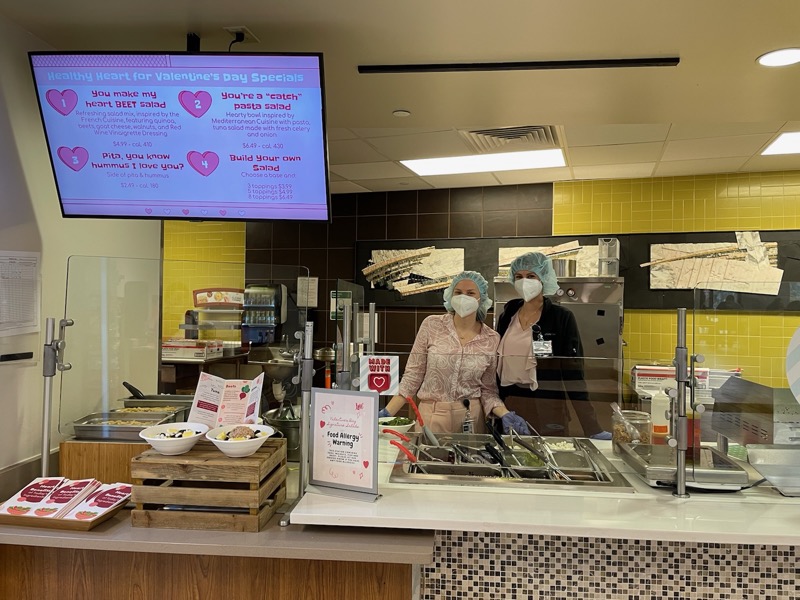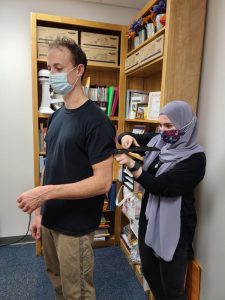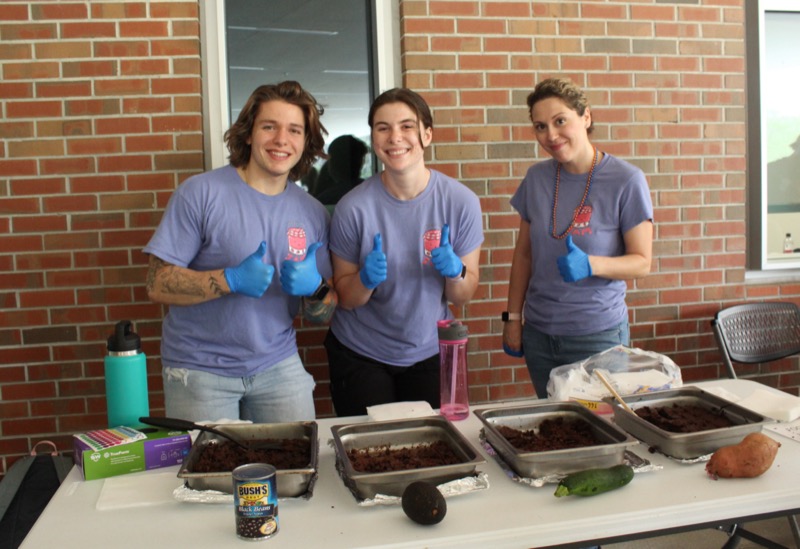 Welcome to our series Food Science and Human Nutrition (FSHN): What Can I Do with My Degree? This series is part of our innovative UF/FSHN Careers Advancement Project (CAP), which captures what it’s really like to earn degrees in food science, nutritional sciences, and dietetics. This project will help you develop your fulfilling career, complete with steps on how to achieve your career goals. Finally, discover your career passion by learning about the daily lives of professionals in food science and human nutrition. Today’s topic: What can I do with a dietetics degree?
Welcome to our series Food Science and Human Nutrition (FSHN): What Can I Do with My Degree? This series is part of our innovative UF/FSHN Careers Advancement Project (CAP), which captures what it’s really like to earn degrees in food science, nutritional sciences, and dietetics. This project will help you develop your fulfilling career, complete with steps on how to achieve your career goals. Finally, discover your career passion by learning about the daily lives of professionals in food science and human nutrition. Today’s topic: What can I do with a dietetics degree?
This installment of UF/FSHN CAP explores the many exciting career options for those earning a degree in dietetics. In this article, we offer an overview of the dietetics field and its career options. Future articles will share details of each dietetics career option.

By the end of this article, you will know:
- An overview of the dietetics field
- How to obtain a degree in dietetics
- Career options after obtaining a degree in dietetics
- Tips for making the most of your dietetics studies
What Is Dietetics?
Dietetics involves applying knowledge of food and nutrition to understanding and promoting the health and well-being of individuals and populations. Through Medical Nutrition Therapy, educational programs, counseling, menu planning, and more, experts in dietetics help others make informed choices about the food they choose to eat. As people cannot live without eating, an educated approach to food choice that takes into account health, well-being, dietary preferences, and cultural norms is essential.
Dietetics experts not only guide people toward healthy food choices, but they also aim to prevent nutrition-related health problems and manage the dietary treatment of these illnesses. Often, this guidance occurs through dietary modification, or changes to a person’s diet to accommodate health- and preference-related dietary restrictions or requirements.
While dietetics is defined by the practical application of nutrition, the study of nutrition itself concerns investigating how the human body uses nutrients. For more information about the field of nutritional sciences, please check out our introduction to nutritional sciences.

How to obtain a degree in dietetics
To practice dietetics in the US, individuals must become certified to practice dietetics under the national credentialing agency Commission on Dietetic Registration (CDR). To do this, individuals must earn a degree in dietetics through an accredited undergraduate program. Following the degree, practical, hands-on experience in the dietetics field must be obtained through supervised practice experience. Finally, candidates must pass a national credentialing exam and maintain their credentials through the completion of continuing education credits. Depending on the state in which the individual wishes to practice, state licensure may also be required.

Two credentials allow individuals to practice dietetics in the US:
In addition to a four-year undergraduate degree, an RDN is required to complete a graduate degree (as of January 1, 2024), a 1000-hour dietetic internship, and the national registration exam, while an NDTR can earn their credential through one of several pathways.
In the UF/FSHN department, we offer two dietetics programs:
Both programs offer an in-depth dietetics education, and graduates of our DPD program have enjoyed a 100% match rate for dietetic internships for the past seven years. Graduates of the MS-DI program have earned master’s degrees while completing their dietetic internships and are eligible to sit for the national exam to become RDNs. For those interested in becoming NDTRs, check out the information on CDR’s NDTR page.
In the video below, join UF’s Dr. Beth Gankofski (Director – Undergraduate Dietetics Program) and Mrs. Kohrine Hazim (Dietetics Program Coordinator) to explore dietetics and learn what it takes to become an RDN.
What are the career options for someone with a dietetics degree?
Registered dietitian nutritionists work in a variety of settings, such as hospitals, outpatient centers, food service operations, universities, private practices, communities, research facilities, and more. Job titles include clinical dietitian, food service dietitian, community dietitian, private practice dietitian, and research dietitian, with a number of specific job titles in each group. According to the Academy’s 2021 Compensation and Benefits survey of the Dietetics Profession, the median full-time salary of all RDNs is around $70,000 per year.
Nutrition and dietetics technicians, registered are found under the supervision of RDNs in certain direct client/patient nutrition care situations. They may work independently giving nutrition education in areas such as community centers, schools, food companies, and public health agencies. According to the Academy’s 2021 Compensation and Benefits Survey of the Dietetics Profession, the median full-time salary of all NDTRs is around $48,300 per year.

Options for those forgoing the RDN or NDTR career path
Many people who obtain dietetics degrees go on to become RDNs or NDTRs, but others choose to pursue a less traditional career path. With a quality education in the practical applications of nutrition, graduates of dietetics programs can work in areas such as healthcare, food service, public health, and government agencies, within the scope of practice for a non-credentialed practitioner.
Dietetics program graduates may also enter a graduate program in dietetics or a related field. Areas studied include nutrient metabolism, disease prevention, nutrition intervention, food science, and public health. Graduates may also pursue clinical degree pathways like dentistry, medicine, or Physician’s Assistant (PA) programs. For individuals who wish to pursue an RDN credential in the future, earning a graduate degree (either a master’s or doctorate) is essential. Effective January 1, 2024, the minimum degree requirement to take the RDN registration exam changes from a bachelor’s degree to a master’s degree.
For additional information about careers in dietetics, please check out the FAQs from the Academy of Nutrition and Dietetics (AND).

Tips for making the most of your dietetics studies
When embarking on any career journey, it pays to explore your options early on. Current RDNs, NDTRs, and other dietetics professionals are the best resource for learning what working in their fields is really like. Set up times to chat with professionals in areas that interest you. Conduct informational interviews at facilities at which you would like to work and ask to shadow these dietetics experts as they go about their day. You will gain real-world experience that supplements classroom studies and career research.
As a student, get to know your professors and classmates. Not only can they offer support as you complete your education, but they will also be your colleagues as you begin your career. Ask your professors for advice on how to succeed in their classes. Develop a work and study routine that allows you to complete your work on time while thoroughly learning the material. And, of course, take care of your own health as you learn to take care of others’ health: eat well, exercise, support your mental health, make time for hobbies, and get plenty of sleep.
Finally, consider exploring other food- and nutrition-related fields. The UF/FSHN department offers undergraduate and graduate degrees in dietetics, nutritional sciences, and food science. Learn more about these programs below.
Interested in learning more about careers in Food Science and Human Nutrition? Check out our UF/FSHN CAP series (additional links forthcoming):
(1) What Can I Do with My Degree?
(2) How to Become a …
(3) Day in the Life
Learn more about FSHN’s renowned programs below!
Undergraduate Programs:
Dietetics
Food Science
Nutritional Sciences
Graduate Programs:
M.S. Dietetic Internship Program
M.S. Food Science and Human Nutrition
Ph.D. Food Science
Ph.D. Nutritional Sciences
 1
1
